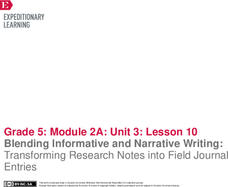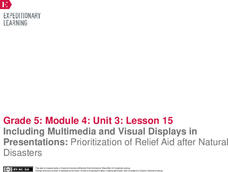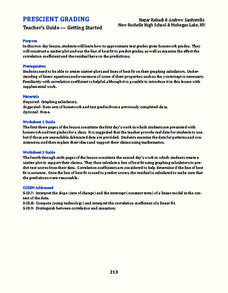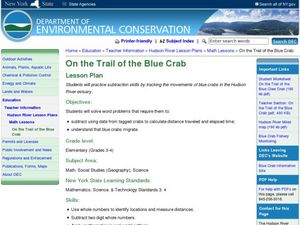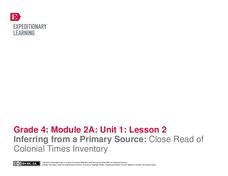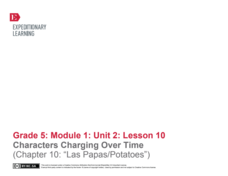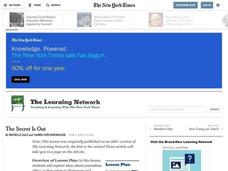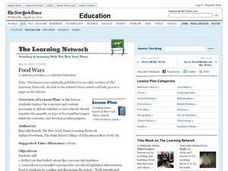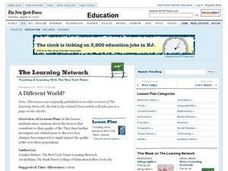EngageNY
Science Talk: How do Bullfrogs Survive
Following the reading of the book Bullfrog at Magnolia Circle, the ninth lesson in this unit involves emerging experts in a science talk about how bullfrogs survive. Looking back through the text, young scholars prepare for the...
Scholastic
Teaching with Aesop's Fables
Bring the applicable morals of Aesop's Fables to your classroom with a series of reading comprehension activities. With 12 different fables with activities and exercises, the packet focuses on the ways learners can apply the fables and...
College Board
AP Physics 1 and 2 Inquiry-Based Lab Investigations
Have you ever wondered what type of AP Physics investigations The College Board wants? This is the guide for you! Sixteen labs covering both Physics I and II will get you started and inspire you to meet the requirement of 25 percent of...
Curated OER
On-Line Homework Help: An Ethical Dilemma
Students use a visual thesaurus and Vocabgrabber to interpret a news article. In this vocabulary building and comprehension lesson, students analyze quotes from the article. Students use the visual thesaurus and Vocabgrabber to interpret...
EngageNY
Blending Informative and Narrative Writing: Transforming Research Notes into Field Journal Entries
The fabulous four. Scholars learn the four key components for creating an excellent journal entry. They then work to create a journal entry rubric and participate in a mini lesson about organizing and outlining journal entries.
EngageNY
Including Multimedia and Visual Displays in Presentations: Prioritization of Relief Aid after Natural Disasters
It's time to put the plan into practice. Using their plans from the previous lesson plan, scholars create multimedia and visual displays for their opinion speeches. Next, they watch videos of speeches and use a presentation rubric to...
EngageNY
Mid-Unit 3 Assessment: On-Demand Note-Taking about Howler Monkeys
Get the facts straight. Scholars complete their mid-unit assessment by reading a text, watching a video, and observing a picture about howler monkeys. They take notes about the facts they discover to use in future lessons.
EngageNY
End of Unit Assessment, Part 1: On-Demand Essay “What Makes A Hurricane A Natural Disaster?”
It's time to refine writing and word choice. Learners work on Part 1 of their end of unit assessment by creating an essay titled What Makes a Hurricane a Natural Disaster? They use glossaries and graphic organizers from previous lessons...
EngageNY
Summarizing Complex Ideas: Comparing the Original UDHR and the "Plain Language" Version
The eighth lesson plan in this series continues the focus on vocabulary and increasing young readers' awareness of academic language. Pairs of learners participate in a short vocabulary review activity called Interactive Words in which...
Curated OER
Prescient Grading
Do homework grades really determine test scores? Learn whether lines of best fit, correlation coefficients, and residuals can be used to determine test scores when given homework grades. (It would certainly save teachers time in grading...
Curated OER
Unit Plan for The Catcher in the Rye —A “Place-Based” Approach
"People never notice anything." As part of their study of The Catcher in the Rye, class members adopt Holden Caulfield's approach and spend time as quiet observers of their surrounding, recording their observations/reflections in a...
National Energy Education Development Project
Great Energy Debate
If someone yelled for eight years and eight months, they could produce enough energy to heat one cup of coffee. A lesson on energy encourages scholars to research 10 different energy sources in groups before playing a game. Twenty...
Cornell University
Optical Simulation of a Transmission Electron Microscope
Don't have an electron microscope? Have your classes build the next best thing! A hands-on lesson asks scholars to build a model of Transmission Electron Microscope (TEM). They then use their models to identify the function of each...
Curated OER
On the Trail of the Blue Crab
Third graders read the article "Blue Claw," discuss crab migration, and look at a map of the Hudson River. They complete a worksheet where they must use subtraction to determine the distance migrating crabs travel.Web links, article, and...
EngageNY
Inferring from a Primary Source: Close Read of Colonial Times Inventory
Teach your class about colonial America through an examination of primary documents. First though, start vocabulary notebooks for content-specific and academic vocabulary. Pupils can keep this record during the entire module. Once this...
EngageNY
Characters Changing Over Time (Chapter 10: "Las Papas/Potatos")
Engage further in Esperanza Rising with a focus on close reading and metaphor. Class members zero in on the tenth chapter, examining characters and big ideas. Pupils discuss the text in small groups and as a whole class, and participate...
American Psychological Association
Statistical Significance
Our survey says ...! High school psychology scholars analyze how people create surveys. Three different scenarios help them discover the meaning behind statistical significance. Armed with new knowledge, novice psychologists uncover what...
Curated OER
The Secret is Out
Students explore ideas about journalism ethics as they relate to Watergate and discuss various issues related to an anonymous source being revealed. They write letters to the public editor of The NY Times about credibility and anonymous...
Curated OER
Food Wars
Students investigate the debate whether schools should regulate the amount or type of food and drink students consume. They write and present position papers after reading an online NY Times article.
Curated OER
A Different World?
Students share their opinions in a brainstorming session on the factors that contribute to their quality of life. They read the article "Life Is Better; It Isn't Better. Which Is It?," from the NY Times and discuss the article as a...
Curated OER
Through the Looking Glass: Life in Colonial Times
Fourth graders examine the life and times of those living in the colonial era. With a partner, they use laptops to complete their research on different aspects of colonial life. They also role-play the role of colonists and share their...
Curated OER
A Digital Family Tree Trip Through Time
Learners research their family history by creating a family tree and using online tools. For this family tree lesson, students use bubbl.us to research their biographical information and web the data. Learners create timelines for their...
Curated OER
Ny Secret War: Lesson 10
Fifth graders explore the role of propaganda during the war. In this social studies lesson, 5th graders view various forms of propaganda and design their own propaganda poster.
Curated OER
The Appliance Explosion
Students explain why the number of appliances used today differs greatly from the number used previously. They construct a bar graph to show changes in appliance use over a period of time. They also list appliances that could be eliminated.






